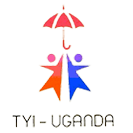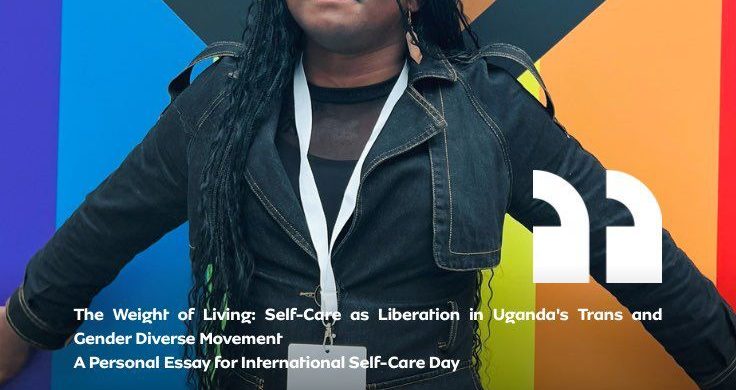A Personal Essay for International Self-Care Day
By Nana Millers
Executive Director, Trans Youth Initiative – Uganda
There is a story I tell myself when the weight of existence becomes too heavy to carry alone. It is the story of Audre Lorde, that magnificent Black, intersectional lesbian feminist poet, who understood that “caring for myself is not self-indulgence, it is self-preservation.” I return to these words like a prayer, like medicine, like the strong hands of an ancestor reaching across time to steady me when the ground beneath my feet threatens to give way.
Here in Uganda, where the red earth meets the endless sky and the rain falls with the intensity of ancient tears, we who dare to exist as transgender people know something profound about survival. We know that our very breathing is an act of rebellion, that our heartbeats drum out rhythms of resistance against a world that would prefer our silence to our songs.
I think often about the particular exhaustion that comes with being both trans and an organizer in this place where laws are written to erase us, where politicians build careers on our suffering, where ordinary people are taught to fear what they do not understand. It is an exhaustion that seeps into your bones like the dampness of Mbarara’s rainy season, persistent and penetrating, the kind that sleep cannot cure because it is not merely physical tiredness but the deep weariness of souls under siege.
The tragedy—and perhaps this is true everywhere, but it feels especially acute here—is that we who fight for liberation often forget that we ourselves need liberating. We become so consumed with the urgent work of changing hearts and minds, of challenging unjust laws, of creating spaces for our community to exist safely, that we neglect the revolutionary act of caring for ourselves. We forget that martyrdom serves no one if it means we burn out before the real work is done.
I have watched brilliant activists in our community dissolve under the pressure of representation. There is something particularly crushing about being expected to be the spokesperson for an entire identity, to have your personal trauma become public property, to smile graciously while others debate your right to exist as if your humanity were a theoretical concept rather than a lived reality. The emotional labor is immense and largely unacknowledged.
In the organizational meetings held in cramped hotels across Kampala, in the safe houses where we gather to plan and strategize, and in the late-night phone calls where we check on each other’s safety, there is often an unspoken assumption that dedication to the cause means sacrificing ourselves completely. We measure our commitment by how much we can endure, how little we need, and how selflessly we can give until there is nothing left.
But Audre Lorde knew better. She understood that this kind of thinking is itself a product of oppressive systems that benefit from our self-destruction. When marginalized people exhaust themselves fighting for scraps of dignity, when they internalize the message that their needs don’t matter, when they collapse under the weight of everyone else’s expectations, the status quo remains undisturbed.
Self-care, then, becomes a radical political act. It is the defiant declaration that we matter not just as symbols or statistics or cautionary tales, but as full human beings deserving of tenderness, rest, joy, and peace. It is the recognition that sustainable movements require sustainable activists, that you cannot build lasting change on the foundation of burned-out bodies and depleted spirits.
In Uganda’s context, where accessing basic healthcare can be a herculean task for transgender people, where finding employment without facing discrimination is nearly impossible, where even existing in public spaces can be dangerous, self-care takes on dimensions that go far beyond the bubble baths and spa days promoted by wellness magazines. It becomes a matter of survival in the most literal sense.
Self-care might mean traveling hundreds of kilometers to find a healthcare provider who will treat you with dignity. It might mean spending precious resources on therapy with someone who understands the particular trauma of living in a society that criminalizes your existence. It could be as simple as having a day where you don’t have to educate anyone about your identity, where you can exist without explanation or justification.
Sometimes self-care looks like setting boundaries with well-meaning allies who want to help but don’t understand the emotional cost of constantly reliving your trauma for their education. It might mean saying no to that interview request, declining to speak at that panel, refusing to be the token trans person in spaces that benefit from your presence more than they help you.
Financial self-care becomes crucial when you realize that economic independence is often the difference between staying safe and becoming vulnerable to exploitation. Many transgender people in Uganda face employment discrimination that pushes them into survival sex work or other precarious situations. Building financial literacy, creating income streams, and participating in rotating savings groups—these become acts of resistance against systems designed to keep us economically marginalized.
Mental health support takes on particular urgency when you’re navigating not just individual trauma but collective trauma, not just personal rejection but societal hostility. The hypervigilance required to move through the world safely as a transgender person in Uganda is exhausting. Constantly scanning for threats, always calculating risks, always performing versions of yourself that others can tolerate—this constant code-switching depletes the spirit in ways that are difficult to quantify but impossible to ignore.
Community care becomes intertwined with self-care because individual healing cannot happen in isolation. We need spaces where we can be vulnerable without judgment, where we can admit when we’re struggling without being seen as weak links in the movement. We need a chosen family that understands our particular struggles, who can hold space for our pain without trying to fix us, who celebrate our victories without minimizing our ongoing challenges.
Physical self-care intersects with gender-affirming care in complex ways. For many transgender people in Uganda, accessing hormones or surgical interventions requires navigating systems that are at best indifferent and at worst actively hostile. This might mean saving money for years to travel abroad for procedures, finding creative ways to access medications, or learning to love your body exactly as it is while working toward the changes you desire.
The spiritual dimension of self-care cannot be overlooked, especially in a country where religion plays such a significant role in justifying discrimination against LGBTQ+ people. Many transgender people in Uganda have complicated relationships with faith traditions that have been used to condemn them. Reclaiming spirituality on your own terms, finding a connection to the divine that affirms rather than condemns your identity, and creating rituals of self-blessing—these become profound acts of resistance.
Joy, too, is revolutionary. Amid struggle, it is easy to forget that we deserve happiness, that pleasure is not frivolous, that laughter is medicine. Self-care means protecting space for celebration, for dancing, for falling in love, for friendship, for all the experiences that make life worth living beyond the political struggle.
I think about the young transgender people in our community who are just beginning to understand themselves, who look to those of us who are more visible for guidance on how to navigate this world. What kind of example are we setting if we model only sacrifice and suffering? How can we teach them that their lives have value if we don’t demonstrate that our own lives have value?
The intersectionality of our identities means that our self-care must be equally multifaceted. As transgender people in Uganda, many of us also navigate tribal identity, class dynamics, religious trauma, family rejection, and other forms of marginalization. Our healing must address all aspects of our experience, not just our gender identity.
Self-care is also about creating the kind of world we want to live in. When we practice mutual aid, share resources generously, celebrate each other’s successes without competition or jealousy, and hold space for each other’s grief and joy, we model the beloved community we’re fighting to create.
Something is compelling about self-care practices rooted in African traditions, rather than imported Western concepts of wellness. Ubuntu, the understanding that we are interconnected, that my humanity is bound up in yours, offers a framework for community care that recognizes individual wellbeing as inseparable from collective wellbeing.
Traditional healing practices, meditation techniques, storytelling circles, communal cooking, and collective fireside chats, these approaches to wellbeing have sustained communities through colonization, apartheid, civil wars, and other traumas. They offer models for resistance that don’t rely on individual consumption but on collective care and mutual support.
The climate movement has taught us about sustainability—the understanding that practices which deplete resources faster than they can be replenished are ultimately self-defeating. The same principle applies to social justice movements. Activism that depletes activists faster than new ones can be developed and supported is not sustainable.
This is why Audre Lorde’s words remain so relevant decades after she spoke them. She understood that self-preservation is not selfish but strategic, not individual but collective, not optional but essential. When we care for ourselves radically and completely, we model for others that they too deserve care and protection.
On this International Self-Care Day, as I write from this complicated beautiful country that is home despite everything, I want to say to my fellow organizers: your wellbeing matters. Your rest is productive. Your boundaries are necessary. Your joy is revolutionary. Your healing is part of the work.
The movement needs you alive, whole, and thriving for the long haul. It needs your creativity, your passion, your unique perspective, your irreplaceable contribution. But it needs these things to flow from a well that is regularly replenished, from a spirit that is tended with the same care you give to the community you serve.
Take the nap. Make the therapy appointment. Say no to that additional commitment. Celebrate the small victories. Dance in your living room. Call that friend who makes you laugh. Eat the food that nourishes your body. Spend time in nature. Practice gratitude. Set the boundary. Ask for help.
These are not selfish acts but revolutionary ones. They are declarations that you matter, that your life has value beyond your utility to others, that the world is better when you are healthy and whole and present in it.
As Audre Lorde knew, and as we must remember: caring for ourselves is not self-indulgence, it is self-preservation. And in preserving ourselves, we preserve the movement. In healing ourselves, we contribute to the healing of the world. In loving ourselves fiercely and completely, we create space for others to do the same.
This is how revolutions are sustained. This is how change endures. This is how we not only survive but thrive.
Written with love and solidarity on International Self-Care Day


